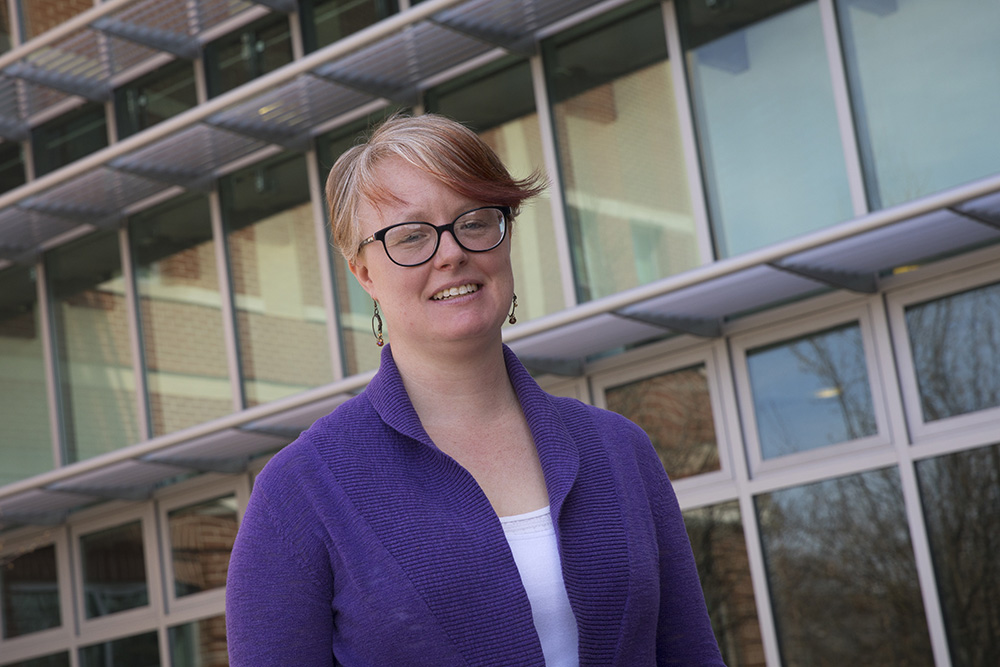Commencement 2017 profile: Becky Jamison
Social work student supports rural mental-health counseling needs

Rebekah “Becky” Jamison traveled more than 120 miles each week for her Master of Social Work (MSW) practicum to work as the only mental-health professional in the small town of Deposit, N.Y. Jamison, who will earn an MSW from Binghamton University’s College of Community and Public Affairs (CCPA), worked at the local United Health Services (UHS) Primary Care site, helping community members cope with issues related to trauma, addiction and abuse.
“I served a broad range of clients — from 4-year-olds to people in their 70s,” said Jamison, who started her work in human services at an addiction-rehabilitation center before pursuing her master’s degree. “I was the only counselor in the entire town.”
Adverse experiences in her childhood and substance-abuse issues in her teens and 20s led Jamison to the “helping profession.”
“I am a survivor of sexual abuse, and later self-medicated with alcohol and drugs to cope. But I’m also someone whose life was changed through the selflessness of others, so I want to have that kind of impact on someone’s life,” she said. “I want to help people by providing the same kind of support that enabled me to overcome struggles.”
Jamison explained the Deposit community, which has no major industries, has been affected by severe economic downturn.
“I worked with a lot of individuals who have chronic conditions who need regular services, yet they were experiencing four- to five-month gaps between care or had no means of transport to get treatment,” Jamison said. “Despite these challenges, I’m still in awe of the resiliency and hope that the people of Deposit have, and I’m grateful to have served them.”
Jamsion, who earned her bachelor’s in anthropology from SUNY New Paltz in 2003, was the manager of a grocery store and worked in herbal medicine before starting her professional work in human services at a rehab center in 2014.
“After getting my bachelor’s degree I was living in Florida for several years, and one day I decided to cash in my retirement and move back to New York,” said Jamison, who is from Trumansburg, N.Y. “I took a huge risk: I’m still taking a huge risk going back to graduate school and funding my entire education on my own.”
After returning to New York and starting her counseling position at a rehab center, she “fell in love” with working with the addiction population.
“There is a perception in our society that working in human services is primarily dealing with difficult people and difficult situations,” she said. “But it’s incredibly rewarding work to see firsthand the growth and universal resiliency of people.”
After experiencing other populations through her coursework and practicum, Jamison said she wants to continue to focus her work on people overcoming addictions.
“Addiction doesn’t discriminate, which means there are many creative, talented and intelligent people from all walks of life suffering from addictions. I believe people who have an addiction are experiencing a disconnect with themselves in some way,” Jamison said. “So overcoming an addiction involves some rediscovering of yourself. As a social worker, it’s really beautiful to be able to help facilitate that process.”
Jamison knew she needed an MSW degree to receive formal training in mental-health therapies and trauma-informed approaches: “I applied to Binghamton University’s MSW program because it’s one of the strongest social work programs in the state,” she said.
Jamison’s practicum in Deposit — a required experiential-learning component for all second-year, full-time MSW students — exposed her to more serious issues related to barriers to mental-health and substance-abuse services in rural communities.
“There are a lot of challenges keeping people in rural areas from getting the services and care they need. My MSW education has taught me not only to be a better counselor, but how to be an effective advocate for helping to eliminate some of those barriers,” Jamison said.
She served as president of the MSW Graduate Student Organization (GSO) for the 2016–17 academic year; she also worked part-time as a graduate assistant for Assistant Professor Youjung Lee. Jamison and Associate Professor Lisa Blitz collaborated on “Courageous Conversations,” a full-day workshop this spring that focused on racial justice in the workplace. Blitz said the workshop hosted more than 50 students, faculty, professionals and licensed social workers in Broome County at the University Downtown Center.
“I am consistently impressed by Becky’s energy, creativity, attention to detail and ability to manage multiple priorities: She balanced school and her field work while still taking on a leadership role overseeing Courageous Conversations and the GSO,” Blitz said. “I’ve always admired Becky’s dedication to social justice, her ability to work collaboratively, and her insights and empathy toward others.”
Jamison said her personal challenges have enabled her to be a more effective social worker.
“I have a unique perspective and insight into being disadvantaged: I know what it’s like to struggle economically, emotionally and mentally, and I think that enables a strong connection between my clients and me,” Jamison said.
When asked why she loves social work, Jamison said she’s a “bleeding heart.”
“I genuinely love to give and be of service to others. I feel a universal love for all sentient beings,” she said. “You need skills and to establish professional boundaries in this field, but I think your clients can always feel genuine empathy. It’s something that comes from within – you can’t learn it in a classroom.”

